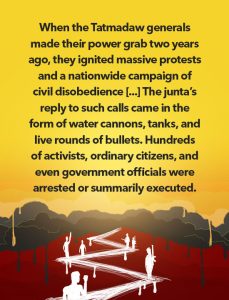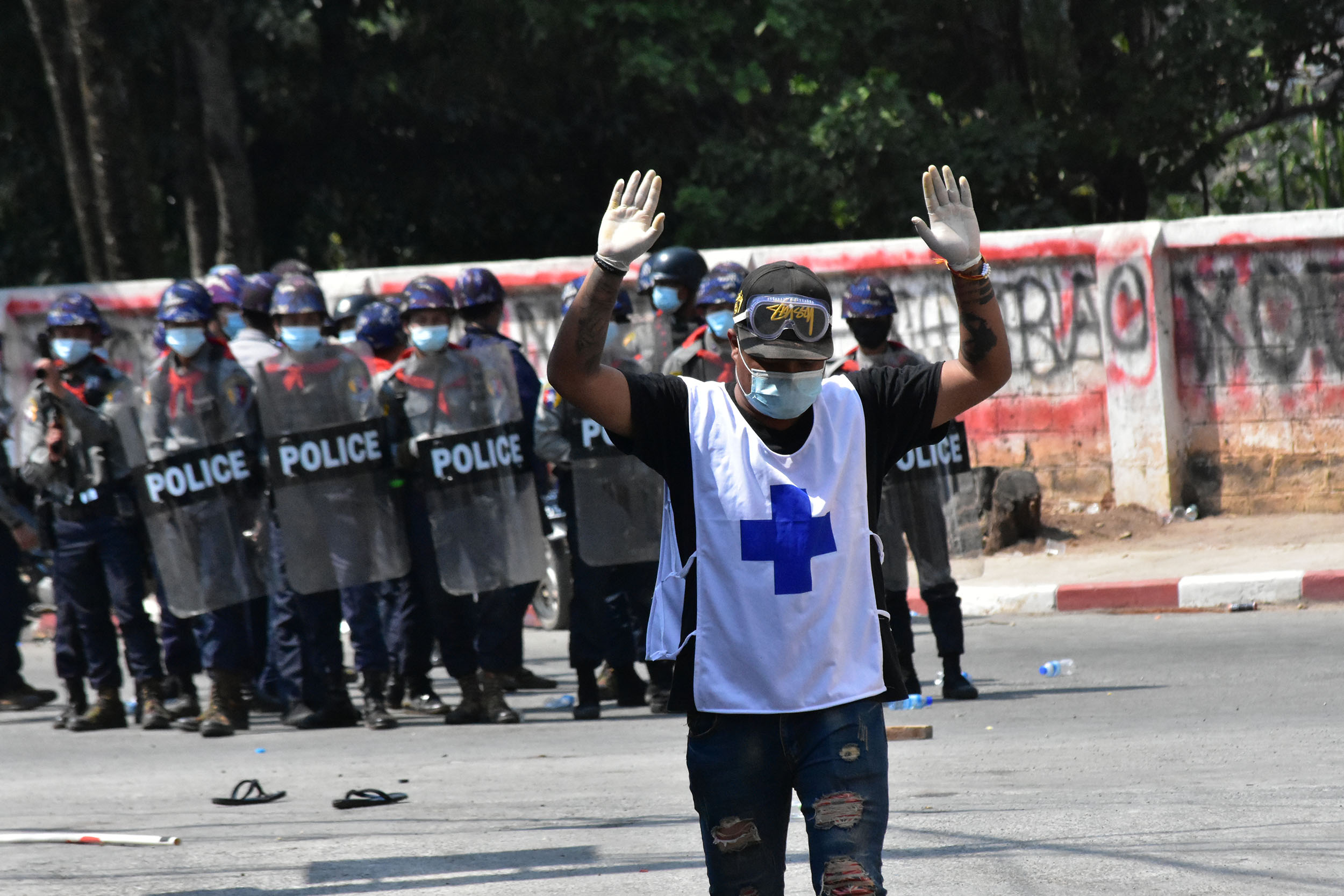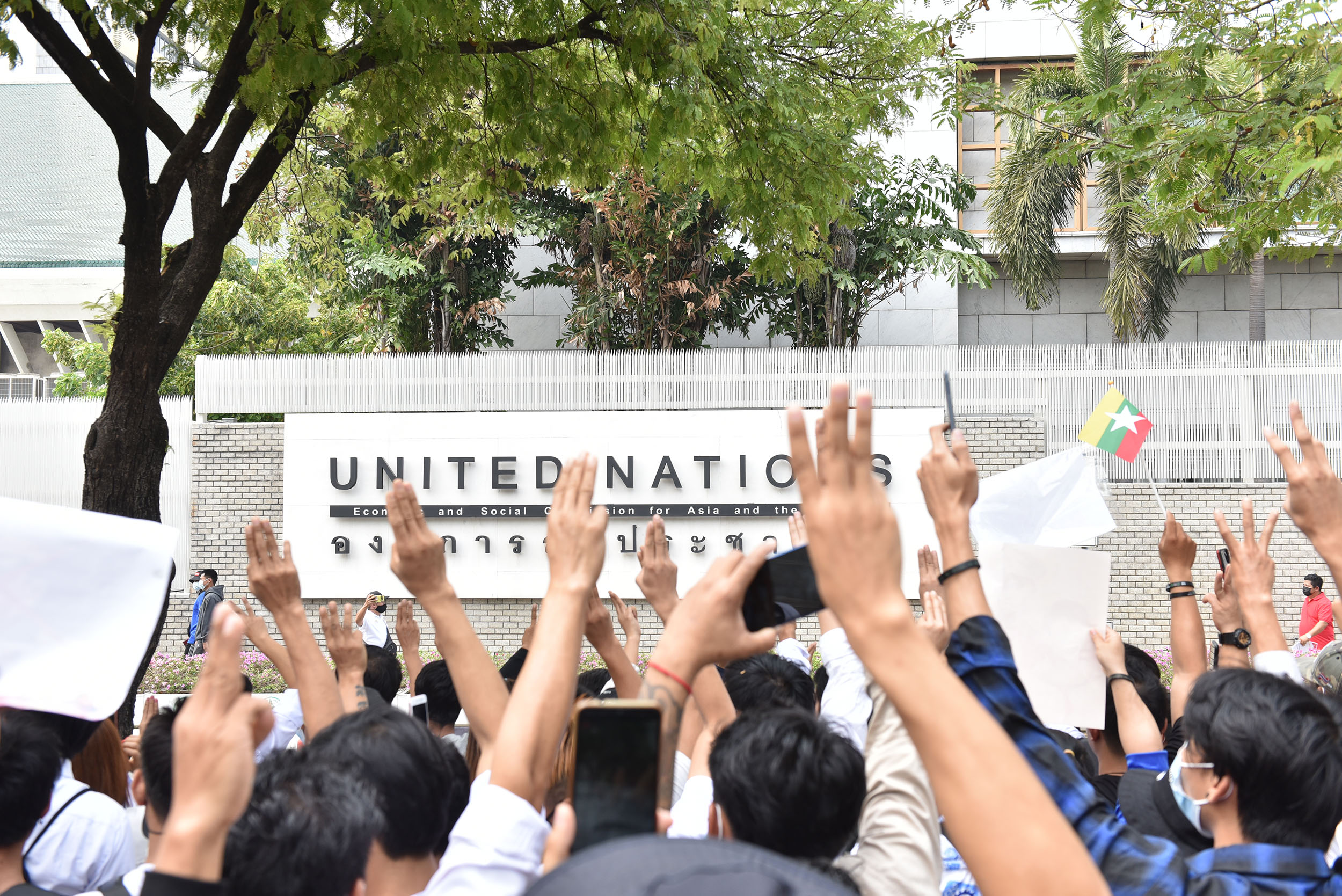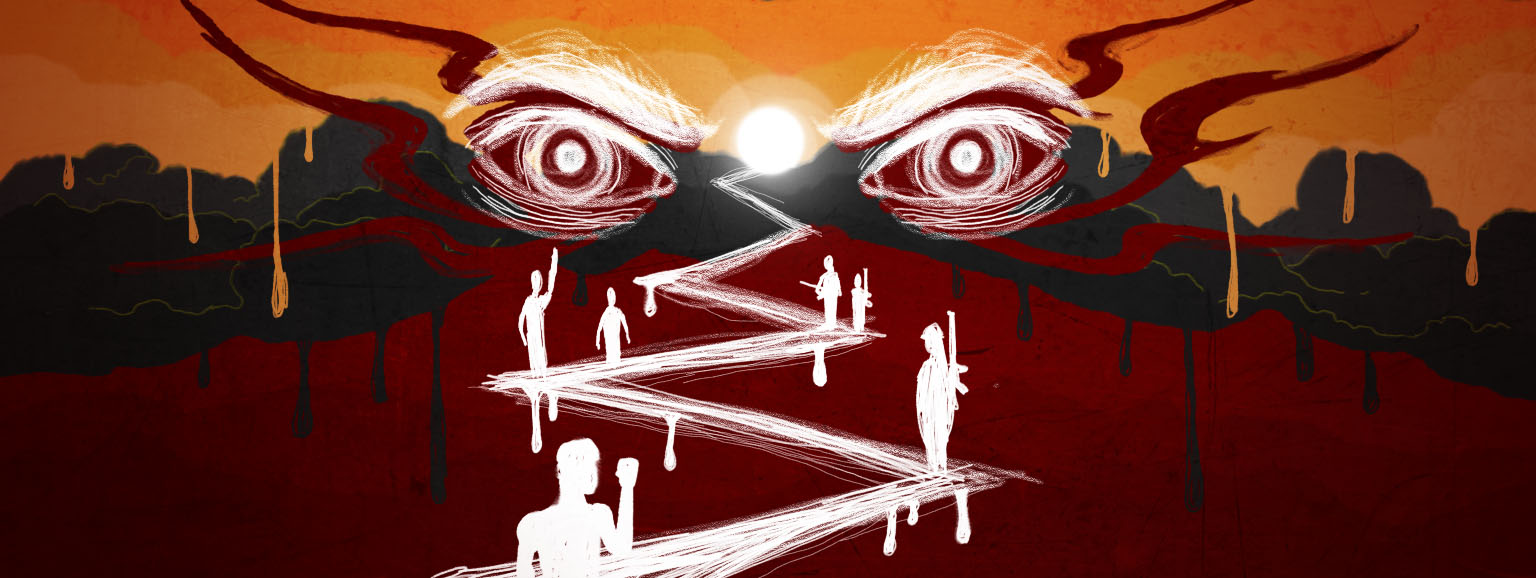|
Getting your Trinity Audio player ready...
|
At a glance:
- As the junta violently cracked down on protests, armed clashes skyrocketed. In the last two years, Myanmar has seen an average of twelve battles per day.
- Over 31,000 civilians have been killed since the 1 February 2021 coup, with at least 3,000 killed by the junta’s forces.
- Experts continue to urge international action to stop the junta and support the belligerent National Unity Government.
O
n 17 January, fisher Lin Lin Wai from the small Shat Pon Village in the Palaw Township of the Tanintharyi region in southern Myanmar, ran into junta forces patrolling the area. After apprehending Buu, as the 33-year-old was commonly known in their village, the military reportedly slit his throat and left him to die.
Just hours before the junta soldiers took their frustrations out on Buu, causing his untimely death, fighters from the combined forces of ethnic armed groups reportedly raided the nearest base of military battalion 285, killing eight soldiers. The budding alliance between the Karen National Defense Organization, Palaw People’s Defence Force (PDF), and others also executed a junta-appointed village administrator and seized weapons, ammunition, and military kits as spoils of war.
MAP 1: Annotated map of the estimated 31,000 civilians killed in Myanmar to date.
Notes:
In January 2023 alone, at least a thousand Burmese were killed across the country as the ongoing civil war escalates by the day.
*On 12 January 2023, the junta dropped six bombs in specific parts of the country, killing five people, including a two-year-old child.
Source: Armed Conflict Location & Event Data Project (ACLED)
Since the last quarter of 2022, Palaw has become a hotspot for increasingly long and drawn out battles between the Myanmar junta forces and the ethnic armed groups of the Karen National Union (KNU) and the freedom fighters under the PDF.
A December junta raid in Lay Kay Kaw township under the Karen state targeted activists seeking refuge and training under the KNU’s wing, spurring sustained armed clashes in the southwest region. The Tatmadaw (government armed forces) detained a number of legal residents in the villages, including two officials from the National League for Democracy (NLD), the party that won the 2020 elections. But the military also sustained losses. At least 108 soldiers from the junta have been killed in action in over 15 consecutive raids and skirmishes to defend the indigenous Karen people-controlled area and halt the Tatmadaw’s advance south. Elsewhere, the pro-democracy forces have been fighting back fiercely and gaining ground. No one doubts, however, that the road ahead will be long and bloody.
Soaring post-coup death toll
Source: Armed Conflict Location & Event Data Project
Two years into the coup that had the military seizing power from elected officials in February 2021, Myanmar is nowhere near normalcy. In fact, State Administration Council (SAC) Prime Minister Senior General Min Aung Hlaing recently announced that the junta will put 37 more townships under martial law, including the whole Tanintharyi Region and six more townships under the Karen and Karenni states.
With over 3,100 dead attesting to the coup’s failed promises of free and fair elections, it comes as no surprise that civil war has broken out in most parts of the country. Formerly disbanded or dormant armed ethnic groups have resurfaced, rekindling armed struggle in several states governed by indigenous peoples. According to state media reports, the junta chief admitted to the National Defense and Security Council that only 198 of the country's 330 townships could be considered “stable and peaceful.”
The expansion of martial-law coverage was apparently a bid to widen that supposed stability. But the junta has also recently said it will now allow “loyal” citizens to carry licensed firearms, sparking fears that the bloodbath will only get worse.
From protests to People's Defense Force
 When the Tatmadaw generals made their power grab two years ago, they ignited massive protests and a nationwide campaign of civil disobedience that demanded the restoration of the Union to duly elected leaders. The junta’s reply to such calls came in the form of water cannons, tanks, and live rounds of bullets. Hundreds of activists, ordinary citizens, and even government officials were arrested or summarily executed.
When the Tatmadaw generals made their power grab two years ago, they ignited massive protests and a nationwide campaign of civil disobedience that demanded the restoration of the Union to duly elected leaders. The junta’s reply to such calls came in the form of water cannons, tanks, and live rounds of bullets. Hundreds of activists, ordinary citizens, and even government officials were arrested or summarily executed.
Data from the non-profit ACLED suggests a clear trend: the declining number of protests since the bloody crackdowns began in February 2021 pushed more activists into taking up arms against the junta.
At the height of the crackdowns, former NLD leaders and activist groups came together to form the National Unity Government (NUG) and the People's Defense Force (PDF), its self-styled armed wing. The shadow coalition government called for a general conscription against the junta and forged military alliances with the ethnic armed groups in Kachin and Karen states, among others.
The PDF’s popularity spread like wildfire all over the country, but especially in the Buddhist-Bamar dominated Dry Zone, which had been free of uprisings and revolutions for decades. Cuddled between the Chindwin and Irrawaddy basins, the Dry Zone took center stage in the tug of war between the NUG and the junta, or the Special Action Council.
Waning protests, skyrocketing armed clashes
Source: Armed Conflict Location & Event Data Project (ACLED)
To gain a foothold in the Sagaing-Mandalay-Magway region triumvirate, the junta armed numerous anti-resistance militias. In the lower Sagaing region alone, in the Dry Zone’s northern area, at least 77 junta-backed militias are fighting for dominance against the PDF’s guerilla forces. Since the coup, this area has seen more than 2,500 military clashes and has received more aerial bombs and drone strikes than any other in the country.

Civilians in peril
By April 2021, the biggest ethnonationalist armies of the Kachin Independence Organization and the Karen National Union had seized military camps in the northeast and southwest of Burma, respectively, denouncing the junta and allying themselves with the NUG. Since then, over 297 PDF guerrilla groups have joined the Spring Revolution, as the protests in Myanmar are locally known, covering most of the country. While more than a quarter of the armed groups remain unidentified or elusive, all groups have shown to have escalated skirmishes from 2021 to 2022. Since last year, clashes have also become more prolonged and intense, lasting hours or even days in some cases. The recent clash in Kyondoe town in Kayin State lasted seven days.
Armed rebellion by the numbers at the frontlines
Source: Armed Conflict Location & Event Data Project (ACLED)
The intensifying and widespread war of attrition, however, is taking a toll on the civilian population. Fascist attacks, done mostly by advancing troops of the junta, have upended the lives and livelihoods of residents in at least 207 of the 330 Myanmar townships.
The independent non-profit Assistance Association of Political Prisoners Burma (AAPPB) estimates that over 3,000 civilians have been killed since the coup, with the majority of them having been shot dead outside their homes, killed in violent crackdowns during protests or in detention.
More civilian deaths during protests and detention
Source: Assistance Association for Political Prisoners Burma (AAPPB)
Causes of civilian deaths at the hands of the junta
Source: Assistance Association for Political Prisoners Burma (AAPPB)
A closer look at the AAPPB data shows that protest crackdowns took the most civilian lives in the first quarter of the junta’s takeover. That, however, has changed in the past two years. Summary execution via a shot in the head has become the trademark of advancing junta troops in the countryside.
Moreover, at least 500 of the 13,000 civilians arrested since 2021 have either been killed or died in prison. Amnesty International's 2022 report showed that people held by the Tatmadaw are often abused physically and mentally.
Outside of prisons, rights activists have also documented at least 200 cases of torture that resulted in death. Many of these cases involved victims being burned alive in their own villages, a part of the junta’s scorched-earth strategy.
Another worrying trend that has emerged, however, is the increasing intensity and frequency of shellings and airstrikes on communities. The last quarter of 2022 saw a huge spike in civilians killed by indiscriminate drone strikes and shellings, a phenomenon that has not been seen in the region since the Vietnam War.
In northeast Myanmar, at least 50 people were killed in October last year as the junta shelled an anniversary concert of the ethnic ruling party Kachin Independence Organization. The jet strike rained down multiple bombs on the mostly civilian celebration of ethnic minorities in the region.
Numerous civilians, including a monk, and their property and livelihoods were destroyed or damaged by sustained bombings in the Kawkareik township of the Kayin State last December.
Multiple reports from Amnesty International, the U.N. Special Rapporteur on Human Rights in Myanmar, and investigative journalism outfit Finance Uncovered have shown that private companies and even governments continue to fund the junta’s indiscriminate air strikes and “war crimes.”
Junta atrocities: the rape of a country
Source: Armed Conflict Location & Event Data Project (ACLED)
Fragile state in a divided world
In his report to the U.N. Human Rights Council, Special Rapporteur Tom Andrews said that decisive steps from a united international community are necessary to “stop the carnage” of the junta. The appointed expert has recommended that the U.N. categorically deny the legitimacy of the coup government and recognize the NUG as the “legitimate representative of the people of Myanmar."
Yet a decisive step remains to be seen. On the eve of the coup’s second anniversary, the United States, Canada, and the United Kingdom all announced new sanctions against people and businesses with ties to the junta in Myanmar. While these were welcomed by some, many rights groups and advocates think these fall short.

Washington has announced sanctions against 11 individuals, including the junta chief Min Aung Hlaing; the European Union has similarly declared a ban on doing business with 10 key junta figures. According to Human Rights Watch, though, this amounts to a “weak international response” and only gives the junta more leeway.
Indeed, despite widespread international condemnation of Myanmar's government, commerce with the country's official institutions continues unabated. In a report released last January, the Special Advisory Council—Myanmar (SAC—M) said that many businesses and state-owned enterprises from Russia, China, Israel, South Korea, India, and Singapore were actively involved in aiding the junta's growing military industry and arming war criminals on the ground.
The NGO Justice for Myanmar also released a parallel report more recently, naming over 60 governments, intergovernmental bodies, U.N. agencies, and financial institutions, among others, that “provide support” to the junta. Last year, the NUG-aligned group revealed 116 companies “arming the coup,” including 38 companies based in Singapore.
Source: Fragile States Index
Myanmar has become a dividing issue in Asia, where many countries are on a downward trend in democracy, press freedom, and inequality. The Association of Southeast Asian Nations (ASEAN) early on had tried to lay down a five-point consensus that it said the junta had to follow as a representative of bloc member Myanmar. And yet damning reports about the junta’s actions against Myanmar’s citizens have fallen on deaf ears within the regional bloc. In fact, despite the junta not delivering on any of the five-point consensus, its representatives were still invited to join ASEAN’s recent meeting in Jakarta.
A disastrous recipe for disaster
Source: Fragile States Index Annual Report 2022
Just recently, media reports revealed that President Jokowi Widodo of Indonesia, this year's chair of the ASEAN, sent an envoy to Yangon to schedule a special meeting. This marked a soft turn from the bloc’s harder stance in the past two years, during which ASEAN was ironically led by Myanmar-junta friendly Cambodia.◉



















